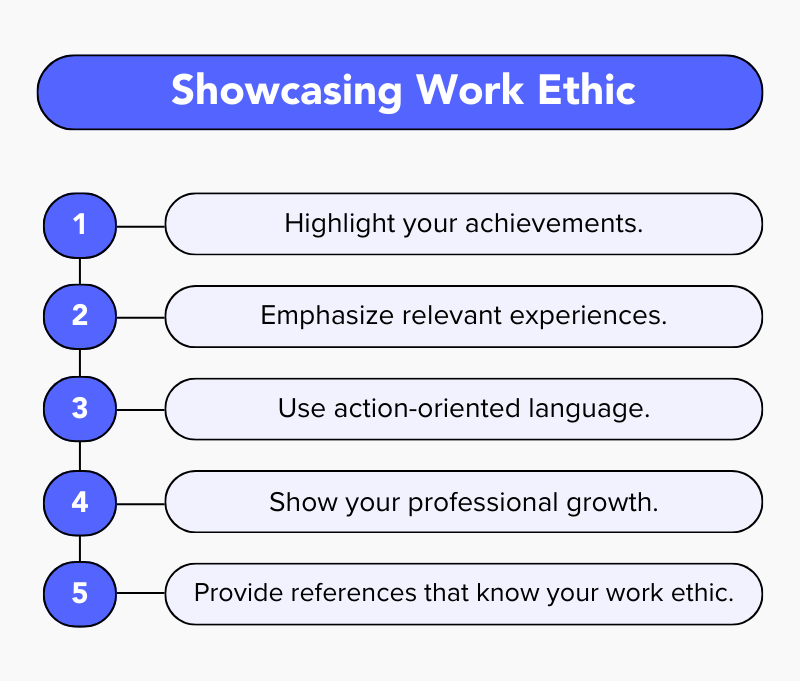Work ethic is important when it comes to getting hired.
A Zipdo survey revealed that 79% of employees agree that strong work ethics are essential for career growth. Furthermore, 92% of HR professionals believe candidates with strong work ethics have a better chance of getting hired.
Showcasing your solid work ethic isn’t just a nice-to-have—it’s a necessity in today’s job market. However, the challenge lies in effectively communicating this intangible quality through tangible means. How do you demonstrate your dedication, diligence, and drive on a single page or in a digital profile?
Here’s what you need to know.
Should you put “good work ethic” on your resume?
The short answer: It’s best to steer clear of writing “good work ethic” as a skill.
The phrase “good work ethic” often finds its way into the list of skills, nestled among other generic attributes like “team player” and “effective communicator.” While these words may seem impressive at first glance, they often fall flat in the eyes of employers.
Why?
Consider this: when faced with a pile of resumes, recruiters and hiring managers seek evidence, not just assertions. They want tangible proof that you possess the qualities they’re looking for. Unfortunately, simply stating that you have a good work ethic doesn’t provide that.
In fact, it can raise doubts about your ability to substantiate such claims.
Furthermore, the term “good work ethic” has become so overused that it has lost much of its impact. It’s become a catch-all phrase, lacking specificity and meaning. In a sea of resumes filled with similar buzzwords, yours risks blending into the background rather than standing out.
This may sound all doom and gloom, but the good news is that if you have a good work ethic, it can speak for itself!

How to describe a good work ethic on your resume
So how can you showcase a strong work ethic on your resume without outright saying so?
Here are a few ways to consider.
1. Highlight achievements.
Your resume is more than just a list of job duties—it showcases your accomplishments and impact in previous roles. When it comes to demonstrating your work ethic, achievements speak volumes.
Consider the projects you’ve spearheaded, the goals you’ve exceeded, or the challenges you’ve overcome. Did you consistently meet tight deadlines, even in the face of adversity? Were you recognized for your exceptional attention to detail or ability to juggle multiple tasks simultaneously?
Highlight these accomplishments prominently on your resume, using quantifiable metrics whenever possible to underscore the scope of your achievements.
For example, instead of simply stating that you have a “strong work ethic,” you might mention that you consistently met or exceeded sales targets by 20% month over month, demonstrating your unwavering commitment to success.
2. Emphasize relevant experiences.
Not all experiences are created equal when it comes to showcasing your work ethic. Focus on highlighting roles or projects most relevant to the position you’re applying for and where your work ethic was particularly evident.
3. Included action-oriented language
The language you use on your resume can make a significant difference in how employers perceive your work ethic. Instead of simply listing responsibilities, use action-oriented language to convey your proactive approach and can-do attitude.
For example, instead of saying “in charge of managing a team,” you might say “led a high-performing team to achieve 30% year-over-year revenue growth.” By framing your experiences in terms of action and results, you paint a vivid picture of your work ethic in action.
4. Show growth.
One way that your work ethic may be evident is your commitment to learning and growth. This can take many forms, including:
- Promotions at work
- Staying up-to-date with industry certifications
- Coursework or classes beyond the requirements
Employers value candidates who invest in their own development and continuously strive for improvement. By including these on your resume, you show that you value growth in your career.
Providing references that can attest to your work ethic
While your resume is a powerful tool for showcasing your work ethic and qualifications, sometimes employers may want additional assurance before making a decision.
This is where your references will be important.
The hiring manager may request references from previous employers or colleagues to validate the claims made on your resume.
When providing references, choose contacts who can speak positively about your reliable work ethic and performance. Good references may include former supervisors, managers, colleagues, or clients who can attest to your reliability, dedication, and ability to deliver results.
Pro tip: Before listing someone as a reference, obtain their permission and inform them about the specific role you’re applying for. This allows them to tailor their feedback to highlight the aspects of your work ethic that are most relevant to the position.
Showing > telling
When it comes to job hunting, showing you’ve got a good work ethic on your resume isn’t just about fancy words—it’s about proving you’re dedicated, hardworking, and committed to doing your best.
You can stand out from the crowd by showing your relevant experiences and achievements, using action-oriented words, and proving your growth mindset. With a resume that shows off your character and skills, you can feel confident as you search for the right job.
